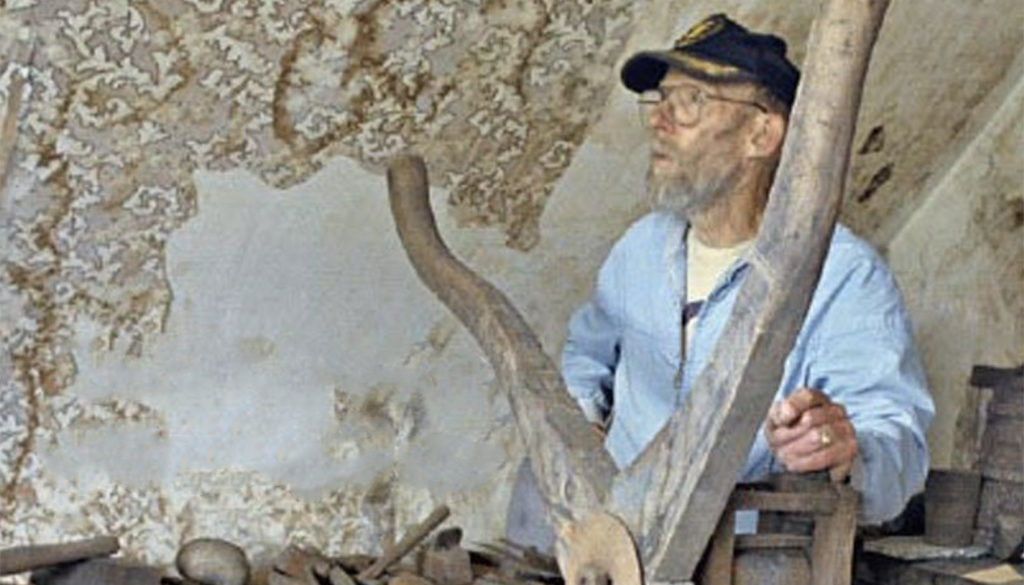Rosamond Purcell (b. 1942) is a Boston-based photographer and writer whose domains are the palimpsest melding of past, present, and future; the natural and the man-made; the wonder and mystery of decay.
Raised in Cambridge, Massachusetts — her father was a professor of Byzantine history and Victorian literature — she’s spent much of her life in the dim back rooms of natural history museums.
In “Swift as a Shadow: Extinct and Endangered Animals” (Mariner Books, $16.68), she writes:
“As a sojourner, I relish the random search: wandering through miles of corridors, opening hundreds of heavy doors, and choking through fumes, dust, and dark to find the holy grail.”
On a field trip to Maine with her students in the mid-’80s, she happened upon one of her greatest discoveries: William Buckminster, who at the time owned 11 acres of what most people would call unsightly, almost terrifyingly chaotic, junk.
Purcell, however, was entranced: The barn, its walls cracking and insides spilling out like a poorly taxidermied elephant. The old family house once owned by a sea captain, likewise engorged with clutter. The mountains of salt-sprayed zinc, aluminum, and brass. “The singular ruined objects,” as she described them in a 2020 interview, “each transformed by decades of snow and summer heat into one-of-a-kind treasures.”
“Owls Head: On the Nature of Lost Things” (Quantuck Lane, $7.70) is the loose story of the unlikely, and semi-comic, friendship that springs up between these two very different kinds of collectors.
Buckminster is descended from generations of land-proud, fiercely stubborn Mainers. His nemesis consists of the ladies of the Owls Head garden club who are always nagging him to clean up his mess. People in plaid Bermuda shorts who walk their poodles. People who would put artificial flowers on their relatives’ graves.
Buckminster himself has a giant patch of rhubarb growing behind the barn, laments the meagerness of that year’s crop of pampas grass, and is incensed that, without his permission, neighbors cut down two of his 30-foot hemlocks because they felt the tops would make “attractive Christmas trees.”
Years ago he started an antique store — still, roughly, standing — with his beloved wife Helen, who kept the books and cheerfully interacted with customers. When she died suddenly, only in her 50s, a gear seemed to have slipped.
An avid — one might say obsessive — picker, Purcell climbs the tottering mountains of broken-down appliances, sodden clothing, mouse-eaten books, handless clock faces, begrimed dolls, and small animal carcasses, making an occasional find and tossing it to an ever-growing pile on the ground that she’ll pay up for later.
Unfailingly courteous and courtly, Buckminster records his sales by hand — his broken-down fingernails like shale — in an old-school carbon copy notebook, including the date, amount, and an esoteric inventory number.
He’s no hermit. He goes into town for groceries each day and out several nights a week to pool tournaments which, well into his 70s, he almost always wins.
Nor is he an aesthete. Unlike Purcell, he’s not interested in artfully arranging his objects and acknowledges that most of the stuff she buys he would bring to the dump.
Still, over time, he begins to intuit her taste. Near a door where he knows she’ll find it, for example, he once leaves a cache of miniature lead figures, most beheaded, under a covering of recycled-tire rubber strips (Purcell ends up buying the lead figures and the rubber, too).
After several years, she’s invited into Buckminster’s actual house, to find a space so dark she can barely see, narrow lanes just wide enough to walk carved through the detritus. Vines grow both outside and inside the windows.
He tries to sort things out from time to time, Buckminster explains, but where would he start?
There’s no place to put anything.
Never does Purcell use the word “hoarder”; never does she pathologize. She learns that when Buckminster was a child his father, an alcoholic, died after accidentally setting the family barn afire while drunk. I armchair-psychologize that his over-the-top collecting is perhaps a subconscious hedge against ever sustaining such a total loss again.
But Purcell simply accepts, marvels at, and develops a profound affection for this one-of-a-kind character. Buckminster has developed his own unique way — as she has, she seems to infer — of inhabiting the world; of keeping the existential fear of death, the ultimate loss, at bay; of developing a complex, borderline absurd system within which to search for the holy grail, and from which he will not be moved.
Over the years she carts carload after carload of objects back to her Harvard-area studio. She begins incorporating them into her pre-existing collections and arranging them by a self-designed taxonomy: Things With Holes; Odes to Downed WWI Pilots.
Twenty years after their first meeting, Buckminster, in his squeaky Navy dress shoes, flies from Rockland, Maine, to Boston. So out of his element that a fellow passenger, concerned on his behalf, delivers him to Purcell at the gate like a child, he follows her obediently around Cambridge: to Harvard’s Museum of Comparative Zoology — the glass flowers and plaster-cracking giraffes and apes — to the home Purcell shares with her husband, Dennis.
At last they enter her studio. They’re on her turf now, and she’s not sure how he’ll react. “Amazing,” Buckminster breathes. “Absolutely amazing. … The garden club ought to see this.”
It’s the highest possible praise, an unspoken recognition that these two lovers of lost things have, in each other, met a mysterious kind of match. He had acknowledged “the profound relationship between his place and mine.”

